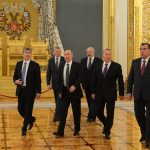- 31 July, 2024
- Foreign Policy

The Islamic Republic of Iran has always opposed changes in state borders and presence of third powers in the South Caucasus region, especially after the 44-day war in 2020.
However, this position seems to have undergone a certain development, which was also reflected in the wording of the press releases following the meeting between Prime Minister of the Republic of Armenia Nikol Pashinyan and the Supreme Leader of the Islamic Revolution Ayatollah Khamenei on July 30.
But before moving on to the wording, let us try to analyze why Iran is against the change of borders and the appearance of third powers in our region.
What is the reason?
The South Caucasus is a region full of conflicts, and the parties to the hottest conflict, Armenia and Azerbaijan, are also neighbors to Iran. However, Azerbaijan is divided into two parts: Azerbaijan proper and the Nakhichevan Autonomous Region in the west. These two parts have no land border. Armenia lies in between, and communication takes place through the territory of Iran. After the defeat of the Armenian side in the 44-day war, Azerbaijan expected that Armenia would provide a corridor to Azerbaijan to connect the two parts. Moreover, the trilateral statement signed by Armenia, Russia and Azerbaijan on November 9, which put an end to the 44-day war, assumed that transport links in the region should be “unblocked”.
“The Republic of Armenia shall guarantee the safety of transport communication between the western regions of the Republic of Azerbaijan and the Nakhichevan Autonomous Republic with a view to organize the unimpeded movement of citizens, vehicles and cargo in both directions. Control over transport communication shall be exercised by the Border Guard Service bodies of the FSS of Russia,” the statement reads.
However, the Armenian side had and still has a number of valid concerns regarding these “transport links”. Official Yerevan is not against the unblocking of communications if it does not involve extraterritorial “corridors”, as Azerbaijan assumingly demands. In addition, providing such a “corridor” under the control of a third country (Russia) will actually deprive Armenia of control over its own territory, leading to highly undesirable and unpredictable consequences.
Iran, for its part, is against such a “corridor”, because it will mean that Azerbaijan will be able to connect with the Nakhichevan Autonomous Region, bypassing the territory of Iran, and this, in turn, will increase Azerbaijan’s ambitions in the region, reduce Azerbaijan’s dependence on Iran (because Iran will lose the monopoly of land communication with Nakhichevan). Besides, the “corridor” will also mean that the road connecting Armenia with Iran will pass through a territory which will be under the control of a third country.
What does Iran say?
Thus, Iran has always declared that it is against the “Zangezur Corridor”. However, on July 30, when RA Prime Minister Nikol Pashinyan visited Iran to attend the inauguration ceremony of newly elected President Masoud Pezeshkian, a meeting was also held with the Supreme Leader of the Islamic Revolution Ayatollah Khamenei. Iranian sources (1, 2, 3) state that Khamenei said that “the launch of the Zangezur route will harm Armenia.”
First of all, it is noteworthy that Khamenei made a statement on this sensitive topic during a rather formal meeting. Secondly, according to the Iranian press, Khamenei used the word “route”. This seems to be the first time that Iran opposes not only the corridor (which could harm the connectivity between Armenia and Iran), but any “route”.
It should be noted that previously Iran was against the “Zangezur Corridor”, or as they say “Zangezur Dalan”, which implied an extraterritorial road. This may mean that Iran is opposed not only to extraterritorial “corridors” or ones with other legal status, but in general to any other route connecting the two parts of Azerbaijan (except the one that passes through Iran).
The wording “will harm Armenia” used by Khamenei is also a matter of concern. It may mean that in case such a “corridor” or “route” is launched, the actions of Iran may also be directed against Armenia in one way or another.
Vahe Ghukasyan
Union of Informed Citizens




